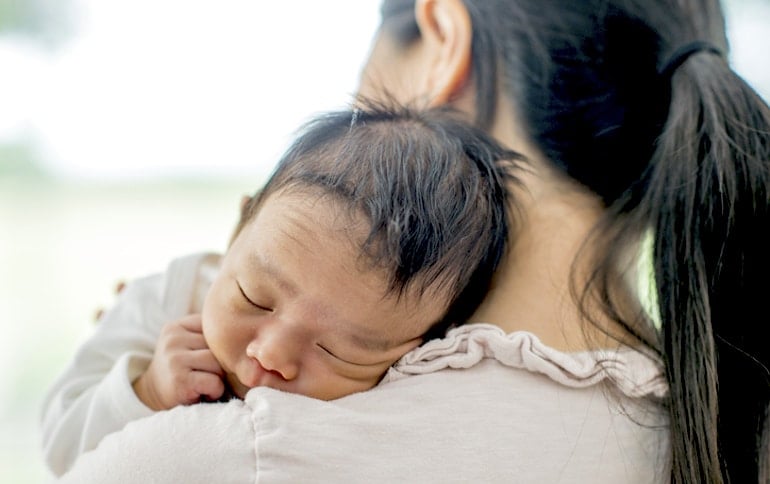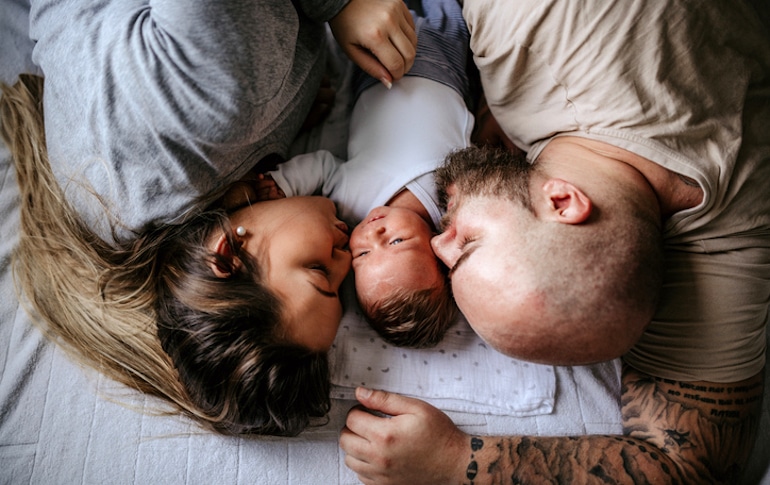Whether you’re a first-time mom or not, prioritizing postpartum self-care is a critical—but often overlooked—part of the post-birthing experience.
To learn more about the what to expect during this period, we spoke to Fahimeh Sasan, MD. She’s the founding OB-GYN of pioneering NYC women’s health clinic Kindbody, which brings gynecologic, fertility, and maternity care—as well as mental health and nutrition services—all under one roof.
Postpartum Self-Care Q&A with Fahimeh Sasan, MD
Dr. Sasan is passionate about spreading awareness of postpartum self-care. Her goal is that more mothers stay healthy and safe so they’re able to provide the best care for their babies.
Here, she details how to take care of your mind and body after giving birth.
What is the postpartum period, exactly?
The postpartum period is officially the first six weeks after a vaginal or C-section birth. This is a time of really significant changes for the mom.
Why is it such a challenging time for women?
Take into consideration someone who just had a baby: There’s the physical exhaustion of giving birth. Add to it the lack of sleep that comes with having a newborn. Then add to that the struggles that someone may experience because they’re trying to breastfeed.
Postpartum can be emotionally burdensome. This can be the case even for women who have had kids previously. There can be anxiety in having a newborn and, at times, not knowing what to do or what the baby’s cries mean.
The postpartum period can be extra challenging because paternity leave is not a thing in our country. That said, there are businesses that are starting to change this practice. But usually, unless a woman is lucky enough to have someone with them 24 hours a day, a lot of responsibility often falls on the woman alone.
I think a lot of this has to do with the unfair expectations that we, as a society, set on moms. If you look at the way villages used to be set up, there was a concept of group living. Everyone used to come to help the new mom.
A person needs help after they have a baby. This isn’t because they’re not a rockstar of a woman. It’s just normal that you might need some help.
Why is postpartum self-care so essential?
It’s incredibly important because our ability to take care of someone else is only as good as how we feel.
If you take care of yourself, you’re going to feel better. If you feel better, you’re going to be on your best game. And when you’re on your best game, then you can take better care of your baby.
You need that stamina, energy, and sense of well-being. The happier you are, the happier your interactions will be with your baby.
What are the postpartum checklist essentials?
The two main health concerns that women really need to be mindful of are their blood pressure and postpartum depression.
I also can’t overstate the importance of making sure you’re:
- drinking enough water
- eating well
- being mindful of your own sleep hygiene
If you’re not doing these things, it can lead to mental health issues.
In particular, I can’t stress enough how important it is to sleep when your baby sleeps in those first six weeks. If your baby is up all night and sleeps during the day, then go ahead and sleep during the day. Adapt to their schedule.
Remember: It’s okay if your house is a mess or you haven’t made your bed yet.
What else should we know about self-care for new moms?
Know that it’s okay to feel overwhelmed and that it’s normal to cry for no reason. If this happens in the first two weeks after delivery, it’s called the baby blues. This doesn’t mean you’re depressed. It’s very common to have a lot of emotional changes as a result of the hormonal drops that occur after delivery.
Also, remember the adage “it takes a village.” It’s so important to have help. Not everyone is lucky enough to have a grandma, aunt, or husband who can come over and help. In these cases, I strongly encourage patients to develop a community where a friend can come over for an hour every day. They can just sit with your baby so you can take a shower or have a quiet moment to yourself.
If you have the benefit of having a partner, then absolutely make a schedule with them. The critical goal is to get at least four continuous hours of sleep. If your partner has to go to work, have them take care of the baby until midnight and then you wake up and take over. And during the times when you’re trying to sleep, try sleeping in a different room with noise blockers so that you can actually rest.
Most importantly, don’t ignore your body. If you don’t feel well or if something hurts, call your doctor and check in. Don’t just assume that everything’s fine.
What inspired you to join Kindbody?
Before working at Kindbody, I was part of a really busy OB-GYN practice at a large academic institution in New York for 12 years. During this time, I started seeing a disconnect.
There was a fragmentation of care and some questionable standards that existed. I often wondered: Why are we telling women to wait a year before they check their fertility? Why are we seeing women only once after they have a baby?
As an expert in the field, it came naturally to me that we could do things better.
For more women’s reproductive and postpartum self-care tips, follow Kindbody on Instagram.












